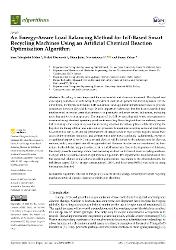| dc.contributor.author | Milan, Sara Tabaghchi | |
| dc.contributor.author | Darbandi, Mehdi | |
| dc.contributor.author | Navimipour, Nima Jafari | |
| dc.contributor.author | Yalcin, Senay | |
| dc.date.accessioned | 2023-10-19T15:12:02Z | |
| dc.date.available | 2023-10-19T15:12:02Z | |
| dc.date.issued | 2023 | |
| dc.identifier.issn | 1999-4893 | |
| dc.identifier.uri | https://doi.org/10.3390/a16020115 | |
| dc.identifier.uri | https://hdl.handle.net/20.500.12469/5320 | |
| dc.description.abstract | Recycling is very important for a sustainable and clean environment. Developed and developing countries are both facing the problem of waste management and recycling issues. On the other hand, the Internet of Things (IoT) is a famous and applicable infrastructure used to provide connection between physical devices. It is an important technology that has been researched and implemented in recent years that promises to positively influence several industries, including recycling and trash management. The impact of the IoT on recycling and waste management is examined using standard operating practices in recycling. Recycling facilities, for instance, can use IoT to manage and keep an eye on the recycling situation in various places while allocating the logistics for transportation and distribution processes to minimize recycling costs and lead times. So, companies can use historical patterns to track usage trends in their service regions, assess their accessibility to gather resources, and arrange their activities accordingly. Additionally, energy is a significant aspect of the IoT since several devices will be linked to the internet, and the devices, sensors, nodes, and objects are all energy-restricted. Because the devices are constrained by their nature, the load-balancing protocol is crucial in an IoT ecosystem. Due to the importance of this issue, this study presents an energy-aware load-balancing method for IoT-based smart recycling machines using an artificial chemical reaction optimization algorithm. The experimental results indicated that the proposed solution could achieve excellent performance. According to the obtained results, the imbalance degree (5.44%), energy consumption (11.38%), and delay time (9.05%) were reduced using the proposed method. | en_US |
| dc.language.iso | eng | en_US |
| dc.publisher | Mdpi | en_US |
| dc.relation.ispartof | Algorithms | en_US |
| dc.rights | info:eu-repo/semantics/openAccess | en_US |
| dc.subject | algorithm | en_US |
| dc.subject | internet of things (IoT) | en_US |
| dc.subject | load balancing | en_US |
| dc.subject | energy consumption | en_US |
| dc.subject | smart recycling machines | en_US |
| dc.subject | artificial chemical reaction optimization algorithm | en_US |
| dc.title | An Energy-Aware Load Balancing Method for IoT-Based Smart Recycling Machines Using an Artificial Chemical Reaction Optimization Algorithm | en_US |
| dc.type | article | en_US |
| dc.authorid | Jafari Navimipour, Nima/0000-0002-5514-5536 | |
| dc.identifier.issue | 2 | en_US |
| dc.identifier.volume | 16 | en_US |
| dc.department | N/A | en_US |
| dc.identifier.wos | WOS:000938108400001 | en_US |
| dc.identifier.doi | 10.3390/a16020115 | en_US |
| dc.identifier.scopus | 2-s2.0-85148721704 | en_US |
| dc.institutionauthor | N/A | |
| dc.relation.publicationcategory | Makale - Uluslararası Hakemli Dergi - Kurum Öğretim Elemanı | en_US |
| dc.authorwosid | Jafari Navimipour, Nima/AAF-5662-2021 | |
| dc.khas | 20231019-WoS | en_US |
















